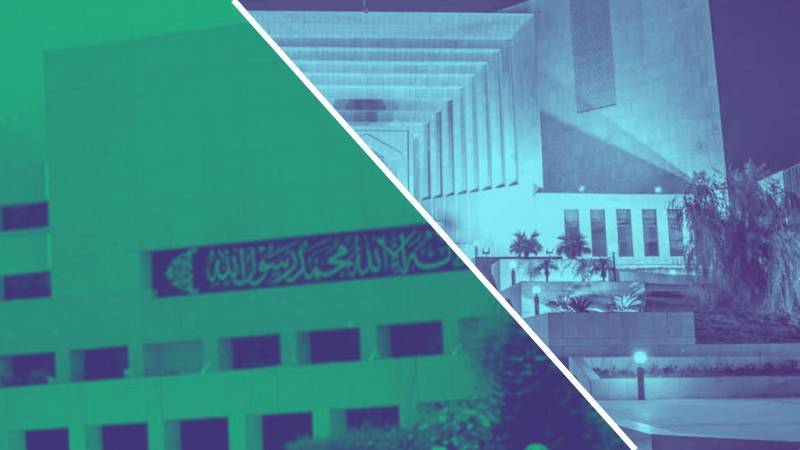
The Supreme Court on Friday constituted a full court bench to hear a petition filed by the Sunni Ittehad Council (SIC) against the Peshawar High Court's (PHC) verdict, wherein it denied allocation of reserved seats to the party.
The full-court bench will be headed by Chief Justice Qazi Faez Isa and comprise 13 judges of the top court. The Supreme Court has a sanctioned strength of 17 judges. However, posts for three judges are vacant, and Justice Hilali is unavailable due to medical issues.
A day ago, a meeting of the three-member committee of the Supreme Court's topmost judges—chaired by Chief Justice Isa—was held. In a majority decision of two to one, the committee decided to form a bench comprising all available judges of the top court to hear the case brought by the SIC.
Justice Munib Akhtar, however, dissented. He proposed that a bench comprising the seven most senior available judges should be formed to hear the case.
The full court bench is scheduled to hear the case on June 3.
Earlier this month, a three-member SC bench headed by Justice Mansoor Ali Shah and including Justice Muhammad Ali Mazhar and Justice Athar Minallah suspended the PHC's verdict and referred the matter to the judges' committee for the formation of a larger bench since it was of first impression and required constitutional interpretation.
In its written order, the court stated that the questions regarding the allocation of reserved seats in the national and provincial assemblies touch upon the foundational constitutional concept of parliamentary democracy, which states that the electorate's voice is truly reflected in the composition of the assemblies.
"Democratic mandate necessitates that the allocation of reserved seats enhances the representativeness of the electorate in the assemblies and upholds the principles of fairness and transparency in the electoral process. It is paramount to prioritise the integrity of the elections so that the Parliament remains a true reflection of the will of the people," it said.
The order also suspended the memberships of assembly members who were inducted against the excess reserved seats awarded to other parties.
In April, SIC chief Sahibzada Hamid Raza, as well as the speaker of the Khyber Pakhtunkhwa (KP) Assembly, had filed appeals in the apex court against the judgment of the PHC, praying to allot the party 67 women and 11 minority seats in the assemblies, besides praying for setting aside the high court's verdict.
Following the February 8 general elections, the Election Commission of Pakistan (ECP) had decided not to allocate reserved seats for women and minorities to the SIC as they had not submitted their list of candidates for those seats at the stipulated time during the election process. Moreover, the ECP held that the SIC had not contested the elections as a party, instead its members contested polls as independent candidates.
The decision was also upheld by the PHC.
However, when the decision was challenged in the Supreme Court, the PHC order was suspended.
Following the SC order, the ECP suspended the victory notifications of 77 lawmakers elected to reserved seats that the SIC had contested.
The Hamid Raza-led SIC gained prominence after Pakistan Tehreek-i-Insaf (PTI)-backed candidates — who had won the February 8 polls — joined it as their party was deprived of its electoral symbol 'bat' and thus the opportunity to participate in the elections as a party. However, PTI's attempt to claim the reserved seats after the elections was thwarted in March when the ECP ruled that the SIC was not entitled to claim its quota for reserved seats "due to having non-curable legal defects and violation of a mandatory provision of submission of party list for reserved seats".
The commission not only denied SIC the reserved seats but also decided to redistribute them among the other parties.

